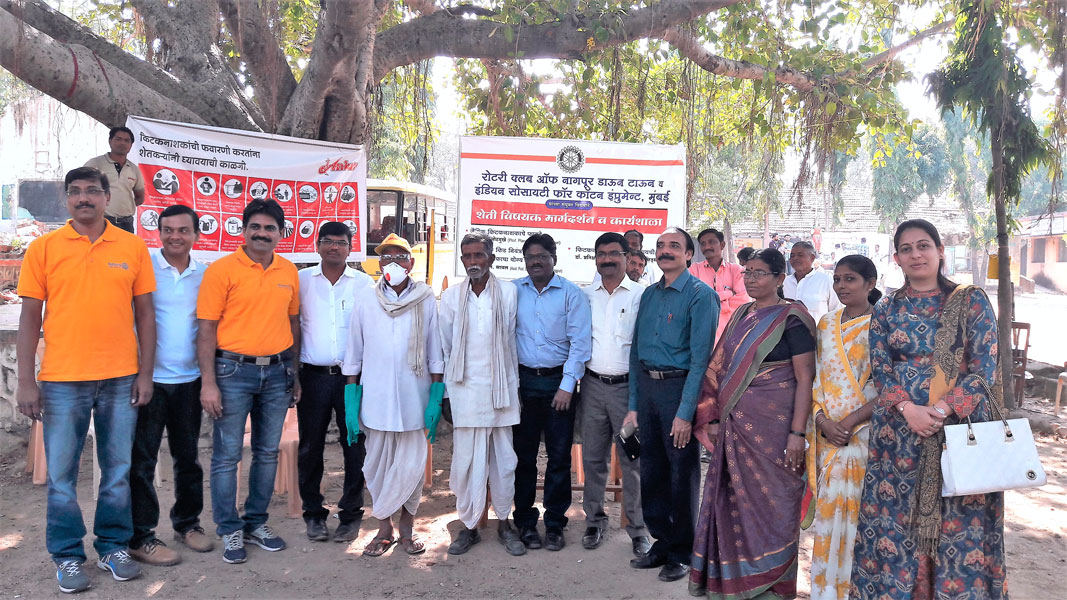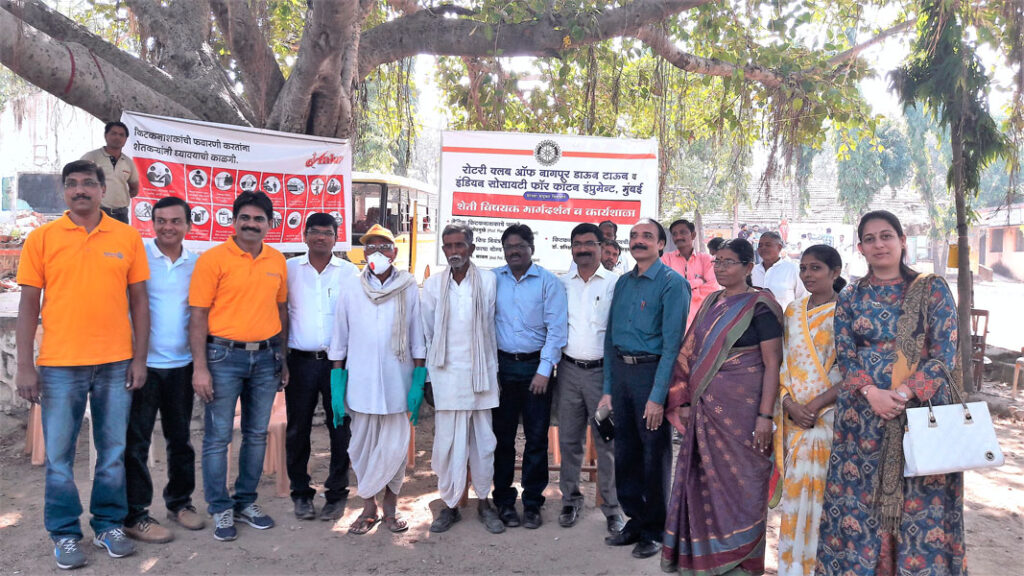In this issue, we bring to you a story of how a Rotarian who is passionate about serving the community she lives in, can use her own business or profession to make a difference in people’s lives, and this not through one, but two projects. Pratiksha Mayee, a member of RC Nagpur Downtown, D 3030, is a deputy GM of Ankur Seeds, and was disturbed to see the state of farmers in the Vidarbha region of Maharashtra, where her club is located and which is severely affected by drought. Vidarbha has often been hitting the headlines for all the wrong reasons — mainly farmer suicides.

“Making matters worse, this year the region has been widely affected by the pink bollworm that has devastated the cotton crop, the main crop of this area,” says Pratiksha. To stop the havoc caused by this pest, many Vidarbha farmers resorted to the indiscriminate use of numerous pesticide sprays. The excessive use of chemical pesticides and lack of precautions while spraying the cotton plants “were some of the reasons for the death of farmers and this has become a politically sensitive issue,” she says.
Many club members had consulted me on trying new ways to grow their own food, and thus the project ‘From Pot to Plate’ came about.
Pratiksha Mayee
Since she deals with an agricultural product, she thought of doing a service project concerning farmers and first of all got consent from her company to support the project that aimed to educate farmers on the safety measures and precautions to be taken while spraying chemical pesticides on their plants. “Our President Vijay Thakare and Secretary Dr Rishikesh Mayee agreed and together we planned the project” to spread awareness on the dangers of chemical pesticides among the farmers of the club’s adopted village Gumthala, which is about 35 km from Nagpur.
Invitation letters were sent out to the farmers in this village, requesting them to attend the awareness programme planned by the club. “Over 90 per cent of the farmers in this village grow cotton, the other crop being chilli. We took extra care to involve the women from the farming families, as they work along with the men on the fields, some of them as contract labour, and hence were the ones who had carried out the pesticide spraying,” says Pratiksha.
The village sarpanch and his members were also invited as guests for the programme so that awareness was spread amongst the village heads to enable them to do a follow up in the village during the cropping season. More than 100 farmers from Gumthala and nearby villages attended the programme, which was sponsored by the Indian Society for Cotton Improvement, Mumbai and Ankur Seeds. Scientists Dr H L Sawal and Dr Subhash Potdukhe from the Agriculture College, Nagpur, were invited to talk about the judicial use of chemical pesticides and the importance and much larger ecological benefits of using bio-fertilisers.

A team of experts from Ankur Seeds demonstrated what safety measures should be taken while using chemical pesticides. Safety kits containing hand gloves, a cap, protective eyewear and a mask were distributed to some of the famers.
The Sarpanch Sushilatai Jamgade was grateful to the club for carrying out this programme and said the crucial information given to the farmers at that meet would go a long way in saving farmers’ lives.
From Pot to Plate
Another innovative project, also done by the club thanks to the initiative taken by Pratiksha, who is a member of the board in her club as well as Editor of its monthly magazine Downtown Buzz, has been named ‘Pot to Plate’. This is a simple project aimed at educating Rotarians about the importance of consuming organic produce free from pesticides and injecting enthusiasm in them on growing their own vegetables and herbs.
“The background is that many of our club members had consulted me on trying out new ways of growing their own food. So the idea of taking up this project shaped in my mind,” she says. Rotarians were guided on how to take up vegetable farming in pots on their terrace or garden.
“This spread a message not only about eating healthy and fresh food but also about the need to make our environment green,” says Pratiksha. She attached a small packet of seeds of vegetables such as tomato, chilli, brinjal, beans and cowpea, sponsored by her company, to the June issue of the club’s magazine Downtown Buzz, and sent them not only to the 100 members of her club but also the district officers, “so that members could learn through the article written by Rtn Saish Kashikar how to sow the seeds and grow their own vegetables. Members were advised that green leafy vegetables like spinach, fenugreek and coriander would not only give a great green look to their terrace or garden, but also provide a never ending supply of nutritious vegetables for their daily meal requirements,” she adds.
Expectedly, the Rotary Anns and their children showed a lot of interest and enthusiasm and planted the seeds, and took care of their baby plants and reaped a rich dividend.
Soon Pot to Plate became a big hit and photos were shared among Rotarians and feedback shared on how they felt at the first sight of the first chilli or tomato. “This project was appreciated by our DG K Sunder Rajan and Rotarians from other clubs in our district during the recently held district conference,” she adds.






